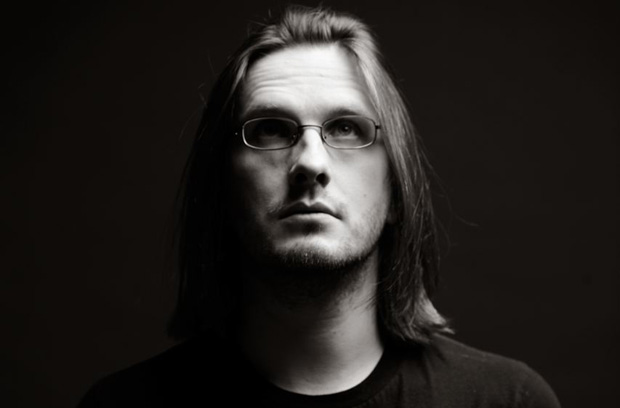Interview: Guitarist Steven Wilson of Blackfield and Porcupine Tree

Guitarist Steven Wilson has his fingers in a lot of pies.
Not only is Wilson a founding member of the progressive rock band Porcupine Tree, but he is one of the driving forces of the experimental rock ensemble I.E.M. and No-Man, the latter featuring singer/songwriter Tom Bowness.
Also, Wilson and Aviv Geffen are the nucleus of rock-pop band Blackfield, which they formed in 2000. The two released their third CD, Welcome to My DNA, last March.
In addition, Wilson has completed his second solo CD, Grace for Drowning, which is scheduled for release in September. On top of that, he's an in-demand producer who spends his free time privately remixing albums by the likes of King Crimson and Jethro Tull.
Wilson took some time to talk to Guitar World from his home in the Green Belt area of England.
What did you initially like most about the guitar that made you want to play?
For me, the guitar was always a tool for writing, production and performance. If there happened to be a piano in the house at the time, I may well have ended up going toward the piano, but it just so happened to be a discarded, nylon-stringed guitar in the house, and I started to pick it up.
Get The Pick Newsletter
All the latest guitar news, interviews, lessons, reviews, deals and more, direct to your inbox!
Did you have any specific guitar heroes?
I was never turned on about the idea of Jimmy Page with the Les Paul or Eric Clapton with the Strat. While I appreciated them, the iconography associated with those guitar legends wasn't something that appealed to me. I wanted to be an auteur, a producer, writer and performer.
I didn't pick up the guitar to learn how to play other people's music but to create sound and to write music. I always had this grander idea in my head to create these musical journeys, and I wanted to be able to hold a piece of plastic in my hands and say, “I made this record. This is my work.”

You mentioned Page with the Les Paul and Clapton with the Strat. Do you have a favorite guitar?
I'm fortunate to be endorsed by Paul Reed Smith for the last few years. They are lovely guitars. You can make them sound like other guitars, but they also have a distinct sound and personality. There aren't many guitars I can use all the way through a show and be able to get all the different sounds and colors and textures I use on the records. If you listen to the records, there is a massive variety of different tones, from the very clean to very distorted to very pure to very processed.
Also, In the past years, I've been using a fantastic guitar by a small company called AlumiSonic, which makes guitars out of aluminum. It looks absolutely gorgeous and it sounds very different from the Paul Reed Smiths. For obvious reasons, it has a more metallic tone and has a tendency to feedback a little more, and (the sound) is a little more brittle and bright. I do use that a lot in the studio these days and occasionally live. In fact, they are the closest I've come to being fetishistic about guitars.
Blackfield's new album, Welcome to my DNA, is the follow-up to Blackfield II, which was released in 2007. Why the long gap between releases?
There have been fairly broad gaps between Blackfield records, but if you look at what else both of us have done in between, it's not like we've been idling our time away. I've made 10 records in the past five years, and Aviv has put a lot of effort into his own solo career.
Blackfield is something we come back to on a fairly even cycle of two to three years. We've made four albums in 10 years now. Most of the songs on the new album were actually written in a comparatively short time, mostly by Aviv. He came to me a year ago and had these songs to make a new record.
I was in the process of recording my second solo record, “Grace for Drowning,” so I was putting all of my writing into my project and asked if he would write the songs for Blackfield and I would produce the album. Aviv ended up writing 10 songs and I contributed one.
8
You've recorded three albums as Blackfield with Aviv Geffen. How are your respective approaches to music different?
He is a songwriter and a performer and not a producer. Songwriters tend to come in, as Aviv does, with a demo of a great song that has the shittiest guitar sound on earth. Those things don't matter to great songwriters, and it's up to me as a producer to say, “Great song, but let's try this guitar tone” or “Let's try these sounds.”
For him it's an intuitive thing to pick up an instrument and use it as a basis for creating melody and harmony and rhythm. Aviv is committed to the idea of the perfect rock or pop song. I, on the other hand, bring to that my interest in creating sound worlds, textures and these big productions. That's the balance of the relationship.
Why did you decide to embark on a solo career on top of the other projects you are involved in?
The inspiration for having a solo career was to draw together all the strands of my musical personality. Being in a band like Porcupine Tree, which is by far the best-known thing I do, people have the idea that the band is all I do. But, of course, I do Blackfield, I do No-Man and Bass Communion and I do production work for other bands.
So the idea of doing records under my own name came from the idea that I felt confident or stupid enough to somehow bring all these strands — ambient music, progressive music, psychedelic music, heavy music, jazz music, noise music, shoegazer music, alternative music — and not make it sound like a complete mess.
The thing that originally attracted me to being a musician was the creative process of making albums, making these musical journeys. I grew up with the idea of the album as a complete cycle of music and not just a bunch of songs randomly thrown together. It was something that actually has a flow and narrative and a shape of its own.
What was the goal of your new solo album, Grace for Drowning?
Three years ago, I made my first solo record, Insurgentes, and was very happy with that record. The idea with the new record is to take it to the next level. In the interim of making these two records, I started to work on remixing records from the 1970s in surround sound, particularly ones by King Crimson and Jethro Tull. I learned why I loved the sound of those records so much. It was about the sound and creativity of those records, and it wasn't something I completely understood until I got inside them. There was a very strong inspiration for my new record. It has a vintage '70s atmosphere to it. It's a double-disc that is epic and experimental, and I think it's the best thing I've done. It's been a year-and-a-half in the making and I look forward to unleashing it.Any plans for a tour?For the first time in my life, I'm going to tour for the solo album under my own name. That's a huge step for me. We're going to do multimedia-oriented in the United States in early November. Porcupine Tree will get together early next year and work on a new record.
“Elton said, ‘I'd better buy that guitar just to have in my house.’ I played it and said, ‘Yeah, you'd better buy it, so I can play it when I come by’”: One of Davey Johnstone's favorite guitars was once a piece of upscale decor for his superstar bandmate
“Leo said, ‘Here, try this guitar.’ I grabbed it, turned it around, held it upside-down backwards and started playing ukulele chords. He almost fell off his chair laughing”: How Dick Dale made the Stratocaster the ultimate surf-rock weapon









